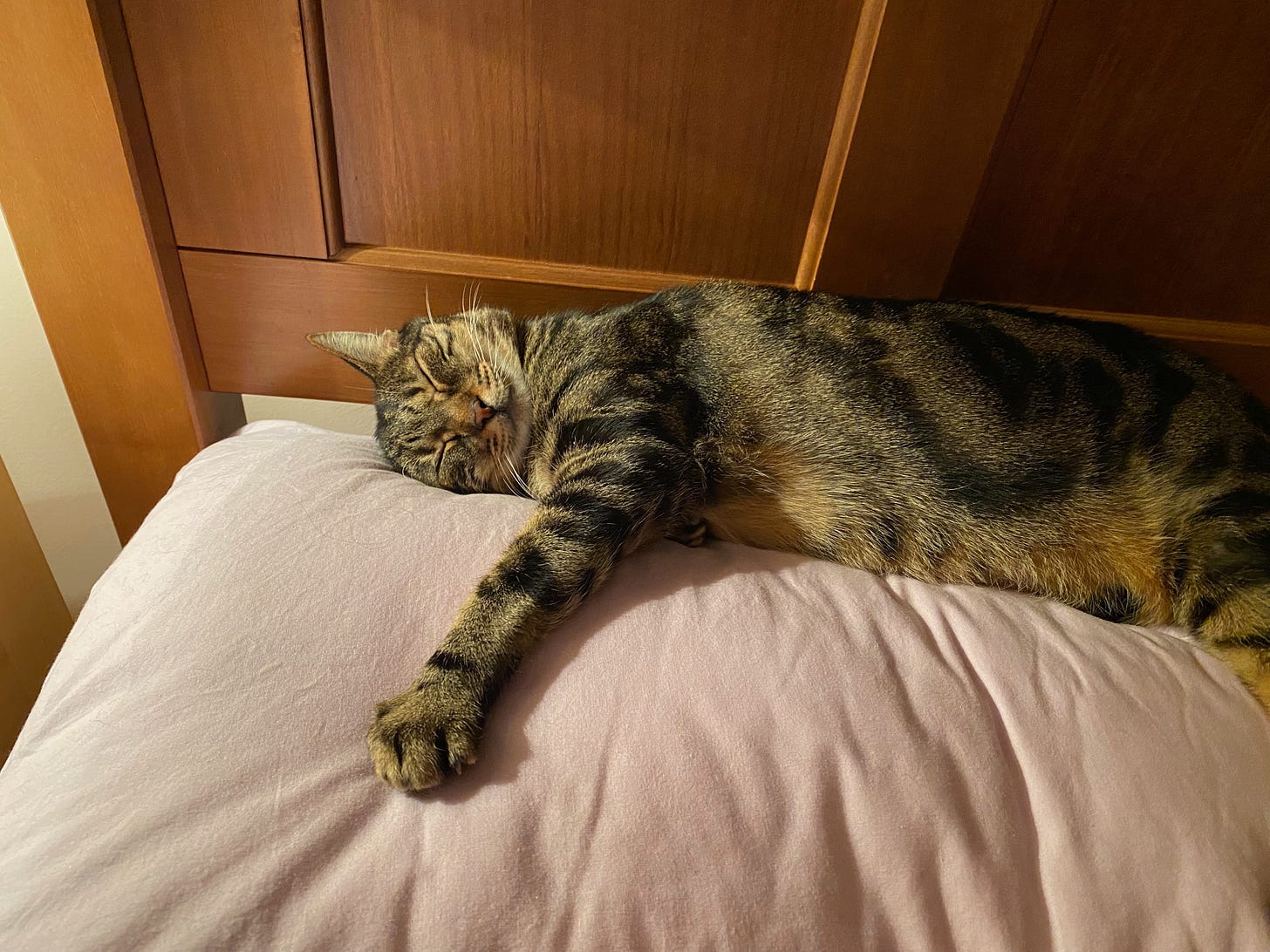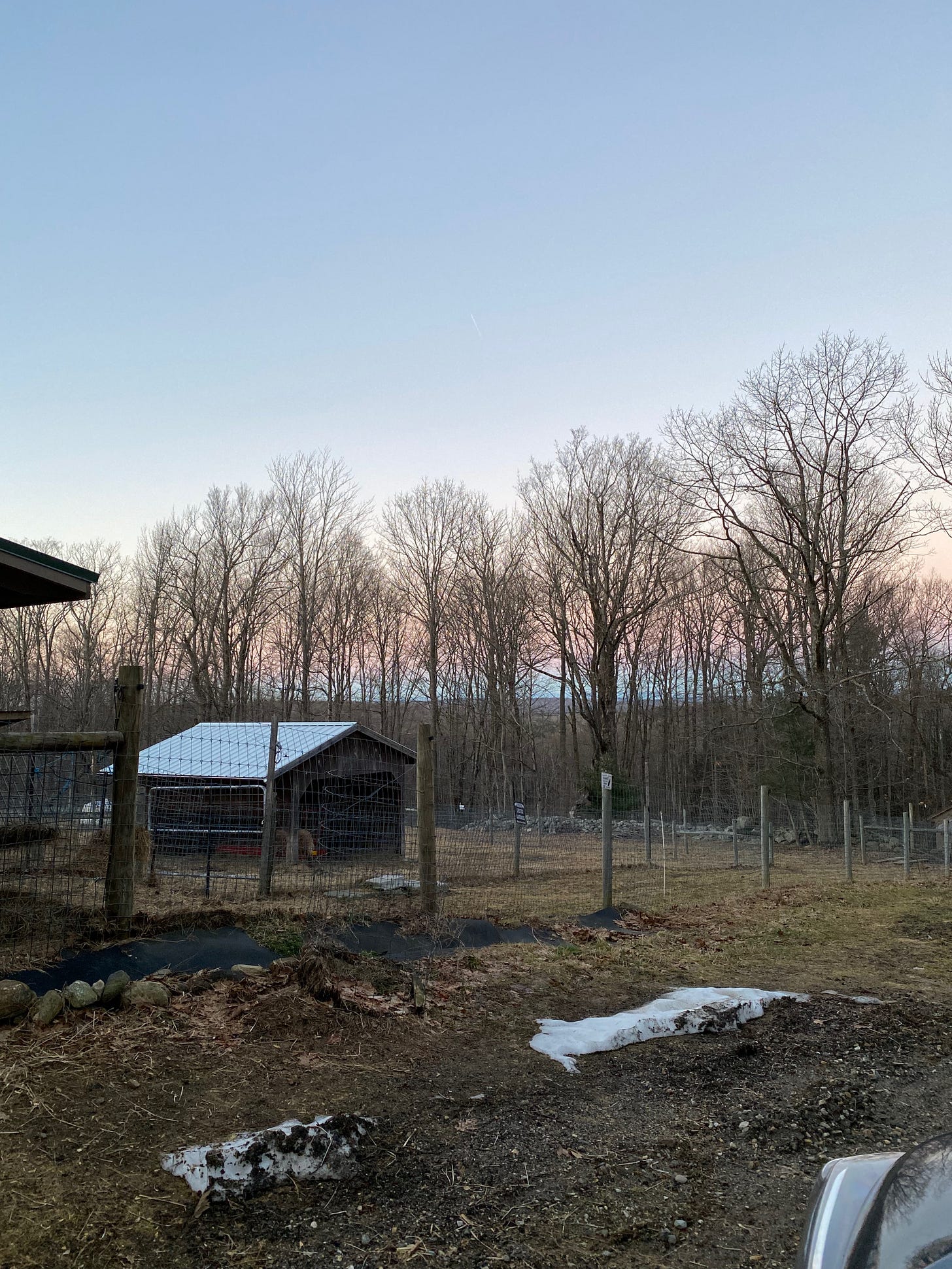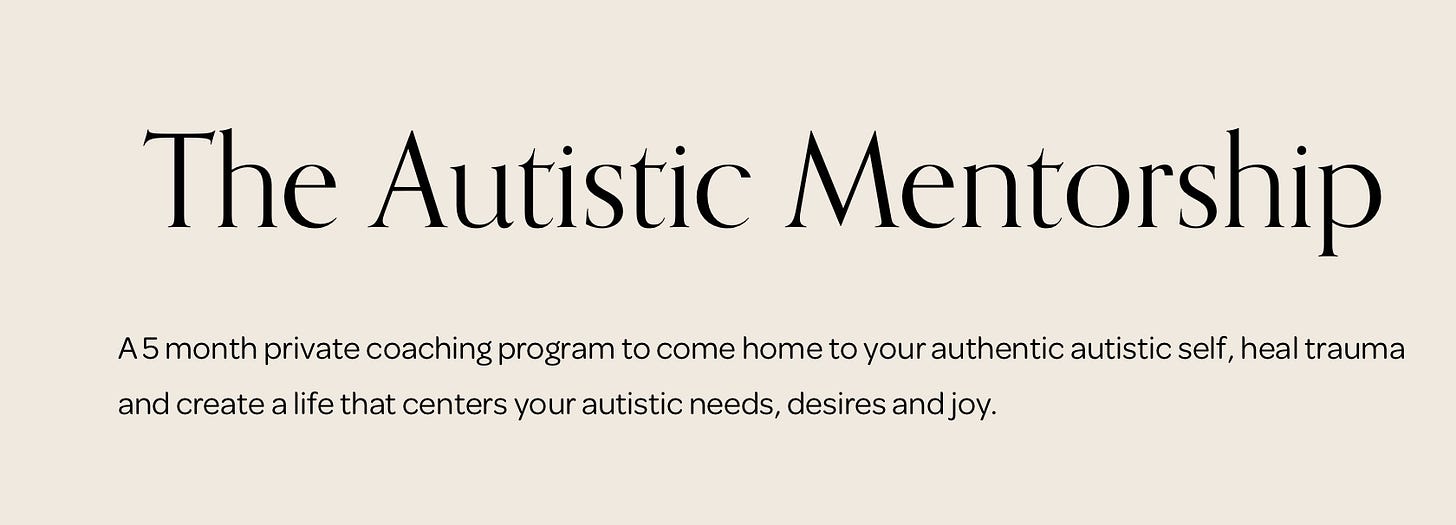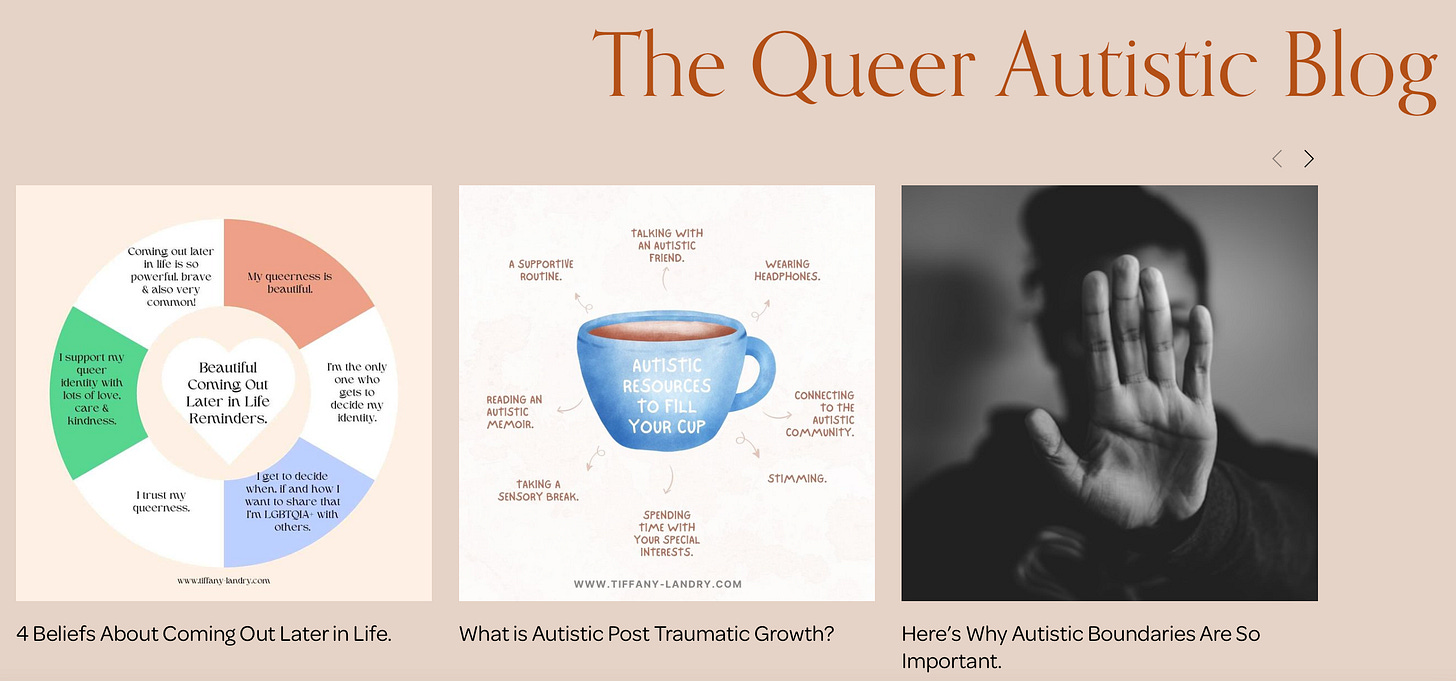Omg, is that what it feels like to be rested?
On resting and creating a slower life in my personal life & business.
Dear reader, in this newsletter I’m going to be talking about sleep as a neurodivergent person and living a slower life since moving to the middle of the forest. If you’ve struggled with sleep or are interested in creating a slower life you might really love this one! If this topic isn’t for you, I suggest scrolling to the end to catch my latest blog posts I’ve written and the queer books I’ve been reading. Sending warm sleep vibes, Tiffany
Since moving to my house in the middle of the woods something kind of magical has been happening: I’ve started getting really excited about sleep. Like as I’m preparing for bed I think to myself “Oh my god, I’m so excited to sleep!” Now for context I’m someone who has both struggled deeply with sleep issues a large portion of my life-think chronic insomnia that sometimes goes on for a year at a time, not being able to go to bed before 2am, sleeping 8 hours and still feeling so damn tired. I know deeply what it feels like to be so desperate for sleep that you feel like crying as well as just living life feeling extremely exhausted. So it is actually a really big thing for me to be going to bed early (for me), to feel well rested and to be so damn excited about sleep. I find it so fascinating that my sleep issues have gotten so much better as I’ve started living a slower life in the country-but also it makes perfect sense. As I’ve shared in other newsletters my previous environment was very disabling for my autistic self. So it makes perfect sense that being in an environment that is autistic accessible and affirming is impacting my life is so much many lovely ways-including sleep!
Bringing an AuDHD lens to sleep has been so supportive.
As an AuDHDer who got diagnosed later in life it has been very enlightening and affirming to learn that there are very specific reasons why sleep can be so challenging for us neurodivergent folks. For example, did you know that on average autistics spend about 15% of their time asleep in REM sleep in comparison to neurotypicals who spend about 25% of their time asleep in REM sleep? This means that us autistics need more sleep to get the same amount of REM sleep the average neurotypical gets. 1
Learning about sleep from an Autistic and ADHD lens also taught me about the concept of revenge bedtime procrastination2 which is the idea of procrastinating bedtime as a way to get “revenge” from the busyness of the day. For Autistics and ADHDers the night is when we get alone time and can devote time to our special interests and things that bring us joy. This is another thing that I’ve been doing for years and just didn’t have a name for! I know for me nighttime has felt for a long time like a time where I can get a break from sensory pain and disruption in my routines. For me personally it wasn’t enough to move to the country, it was essential to be in an environment that was quiet, where my routine could be consistent and not changed and where I wasn’t experiencing sensory pain.
For the slowness of it all.
I am moving so slow these days and it feels so good. A few days after moving into my new house I just naturally started going to bed earlier and waking up earlier. I’ve noticed how delightful it feels to have slow luxurious mornings, to hang out with the cats while they sunbathe, to have my morning routine be slow, steady and consistent. I’ve noticed that slowness is impacting my life in small steady ways such as being more present in life, my nervous system is settling and blooming, there’s an increased capacity, less sensory sensitivities and more spoons.
I’ve been asking myself: “how can I create an even slower life?” Some questions I’ve been pondering are:
What are things that I want to do more of and what are things I want to do less of or stop doing?
What are my values and how can I design my life to support those values?
How can life feel even more delicious?
Being off of social media is delightfully slow.
I’m so grateful to be feeling into these questions while being off of Instagram, TikTok and Facebook. My 6 month social media break officially ends in May but I can’t imagine going back to it. Instagram sends me these emails to notify me that I have new followers or that people I follow are posting things. I love how my response to myself to those emails is always “I’m so glad not to be on there.” I remember clearly how social media would just suck my spoons right out of me, how overstimulated it made me and how it just felt like too much. Why would I want to go back to doing something that overloads my system, feels too much, too fast and too social?
I think part of my own unmasking journey has been going from a place of “I have to do this, there’s no other alternative” to naming “this is disabling and I’m going to either stop this or look for an accessible alternative.” It took me so long to say no to social media and it took me a long time to decide to move away from my super gay city to move to the country. But I’m so glad that saying no to those things (and other things) has brought me so much peace, joy and autistic well being.
I’m still exploring what it looks like to market my business off of social media. I’m mostly just blogging on my blog and I’ve started using Pinterest to post pins of my blog posts. Which feels doable in the sense of it’s fun making cute graphics, pinning them and then leaving Pinterest (I use it on my computer and don’t engage with Pinterest in any other way.) I’m feeling a desire and need for my business to also have slow and steady values. One thing I’m currently changing in my business is a new structure to my main offer The Autistic Mentorship.
The Autistic Mentorship is currently enrolling new clients and has some new changes that I’m very excited about! The Autistic Mentorship now includes:
14 sessions spread out over a 5 month period. More sessions=more support.
Three (75 minute) sessions a month. We’ll have one weekly session during the first three weeks of each month and we’ll take the last week off of each month for integration-both for me and you! Consistency + steady support + space to integrate.
A program document created for you that includes your main coaching topic, 3-5 goals and intentions and developmental objectives to work on during our work together. Clarity + a map for our work together.
Email recaps, personalized practices and a check-in sent to you via email 48 hours after each session. Practices to support you between sessions.
A bonus “check-in” session to be used on a week you need extra support or as a check-in. Because sometimes we just need a little bit of extra support.
If you’d like to explore if The Autistic Mentorship would be a good fit for you or someone you know, you can learn more here and apply directly here. I’d love to chat about if working together would be a good fit for both of us. If you have questions about the program, please feel free to email me or contact me here.
I’d love to share with you two new blogs that I wrote this week:
What is Autistic Post Traumatic Growth: What is autistic post traumatic growth? In this blog post I share with you what autistic post traumatic growth is, what it can look like and key pieces to tending to your own autistic healing journey.
Four Beliefs About Coming Out Later in Life: Did you ever think “It’s too late to come out?” or maybe someone told you something like “you’re not queer, you’re just confused"? In this blog post I share 4 beliefs or messages you might have heard and tailored queer support for each belief.
Queer Things That Delighted Me List:
I’ve been feeling a desire for queer resourcing lately and I’m delighted to share a few queer books + shows that felt so lovely for my queer heart.
How You Get The Girl by Anita Kelly was such a sweet sapphic romance. It’s book three in the Nashville Love series and it’s got one character exploring her sexual identity, another navigating depression-and there is so MUCH care between the two characters which felt so lovely to read. Plus it’s a sports romance if that’s your type of thing!
Portrait of a Body by Julie Delporte is a graphic memoir sharing the author’s journey and reflections on themes like coming out, sexuality, identity and sexual trauma. A tender read but very beautiful.
Gender Agenda with Hannah Gadsby and some very funny genderqueer comedians. You can stream it on Netflix, here is the trailer.
I’m wishing you a slow + delightful weekend.
Thank you for reading this newsletter-and whether you’re new here or have been here for awhile: hi! If you feel called, please feel free to share any reflections in the comments. You can also like this post or share if with anyone you think would benefit.
Sending care,











Revenge bedtime procrastination is so real. I can tell when I'm not doing well because I tend to stay up later even though I know I need to rest. I thought for a long time I wasn't a morning person, but I actually just needed slow, quiet, consistent mornings.
No idea "revenge bedtime procrastination" was a thing but 🙋🏻♂️ I've had insomnia since I was 11-12 - only diagnosed AuDHD last summer. This is interesting - I'm still trying to figure out what works and whether I need meds to help the ADHD side. Sleep is so important especially for stress levels and thresholds but still figuring it out.
Thanks for sharing and yay for you 🙌🏻 getting the sleep and feeling good about it too 😊